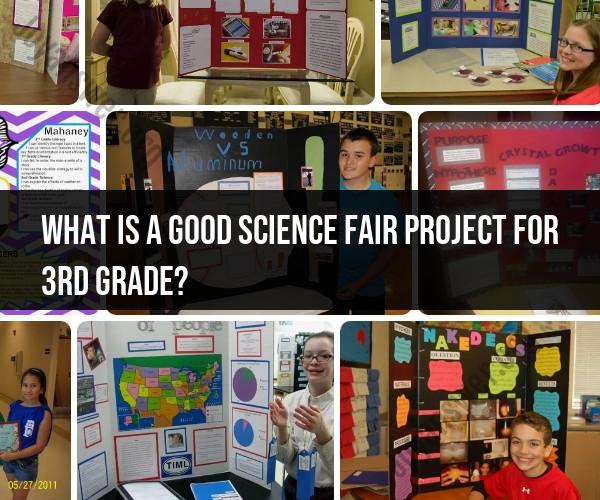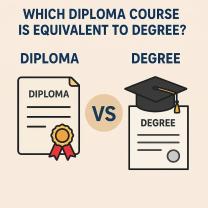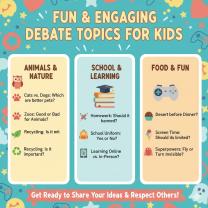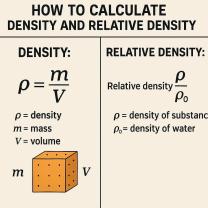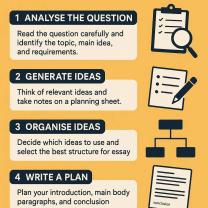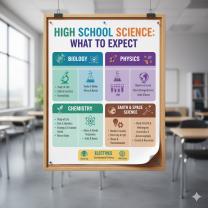What is a good science fair project for 3rd grade?
Science fair projects for 3rd graders should be engaging, age-appropriate, and encourage students to explore scientific concepts. Here are some exciting science fair project ideas for 3rd graders:
Plant Growth: Investigate the factors that affect plant growth, such as sunlight, water, and soil types. Plant the same type of seeds in different conditions and observe their growth over time.
Volcano Eruption: Create a miniature volcano using baking soda and vinegar. Explore how different amounts of baking soda or vinegar affect the eruption.
Magnet Experiments: Explore the properties of magnets. Test which objects are attracted to magnets, how far magnets can attract objects, or create a simple electromagnet.
Static Electricity: Investigate static electricity by rubbing different materials (e.g., a balloon against hair) and observing how they attract or repel objects.
Water Filtration: Create a simple water filtration system using sand, gravel, and a plastic bottle. Test how effective it is at purifying water.
Rain Gauge: Build a rain gauge to measure rainfall. Record daily measurements and analyze the data to understand local weather patterns.
Seed Dispersal: Study how seeds are dispersed by nature. Collect different types of seeds and experiment with various methods of dispersal, such as wind, water, or animals.
Dissolving Candy: Investigate how different types of candy (e.g., gummy bears, chocolate, hard candies) dissolve in water and whether temperature affects the rate of dissolution.
Solar Oven: Create a simple solar oven using a pizza box and aluminum foil. Test its ability to cook or heat food using solar energy.
Density Towers: Explore the concept of density by creating density towers with liquids of different densities (e.g., oil, water, syrup). Observe how they layer and why.
Sound Vibrations: Investigate sound vibrations by making musical instruments from everyday objects, such as rubber bands, bottles, or straws. Explore how the length or tension affects the sound.
Growing Crystals: Grow crystals from different solutions (e.g., salt, sugar, Epsom salt) and compare their size, shape, and color.
Paper Airplanes: Experiment with different paper airplane designs to determine which one flies the farthest or stays in the air the longest.
Food Decomposition: Observe the decomposition of various food items (e.g., fruits, bread) under different conditions (e.g., sunlight, darkness) and analyze the results.
Pendulum Experiment: Create pendulums of different lengths and weights. Measure how changing these variables affects the pendulum's swing.
Remember that the goal of a science fair project for 3rd graders is to encourage curiosity and the scientific method. Ensure that the project is safe and manageable for young students, and encourage them to ask questions, make observations, and draw conclusions from their experiments. Additionally, parental involvement and guidance are often important for younger students participating in science fair projects.
Science Exploration for 3rd Graders: Fun and Educational Project Ideas
Science is a fascinating and important subject that can be enjoyed by students of all ages. Third graders are at a perfect age to start exploring the world of science through hands-on experiments and projects.
Here are a few fun and educational science fair project ideas for third graders:
- Plant growth: Plant a few different types of seeds and observe how they grow. You can compare different growing conditions, such as sunlight, water, and soil type.
- Volcanoes: Build a model volcano and erupt it using baking soda and vinegar. You can experiment with different amounts of baking soda and vinegar to see how they affect the eruption.
- Rainbows: Create a rainbow using a prism or a glass of water. You can also try making a rainbow using mirrors and sunlight.
- Air resistance: Build a paper airplane and test how far it can fly. You can experiment with different designs and materials to see how they affect the flight distance.
- Electricity: Build a simple circuit using a battery, a light bulb, and some wires. You can also experiment with adding different components to the circuit, such as a switch or a buzzer.
These are just a few ideas to get you started. There are many other great science fair project ideas that are appropriate for third graders. With a little creativity, you can come up with a project that is both fun and educational.
Engaging Science Fair Projects for 3rd Graders: Sparking Curiosity and Learning
Science fair projects can be a great way to spark curiosity and learning in third graders. By choosing a project that is interesting to them and that allows them to explore their own scientific questions, students can learn a lot about the world around them.
Here are a few tips for choosing engaging science fair projects for third graders:
- Choose a project that is appropriate for their age and abilities. Third graders are still developing their scientific skills, so it is important to choose a project that is not too complex.
- Make sure the project is interesting to the student. Students are more likely to be engaged in a project if they are interested in the topic.
- Allow the student to explore their own scientific questions. Encouraging students to ask their own questions and design their own experiments is a great way to help them develop their critical thinking skills.
- Provide support and guidance as needed. Third graders may need help with some aspects of their project, such as designing the experiment, collecting data, and analyzing the results.
Hands-On Science: Inspiring 3rd Graders with Exciting Fair Project Options
Hands-on science projects are a great way to inspire third graders and help them learn about the world around them. By doing their own experiments and making their own observations, students can develop a deeper understanding of scientific concepts.
Here are a few exciting fair project options for third graders that involve hands-on science:
- Make a slime: Slime is a fun and easy way to learn about polymers and cross-linking.
- Build a water rocket: Water rockets are a great way to learn about physics and engineering.
- Make a lava lamp: Lava lamps are a fun and easy way to learn about density and convection currents.
- Grow your own crystals: Growing your own crystals is a great way to learn about chemistry and crystallography.
- Make a sundial: Sundials are a fun and easy way to learn about astronomy and timekeeping.
These are just a few ideas to get you started. There are many other great hands-on science fair project options for third graders. With a little creativity, you can come up with a project that is both fun and educational.
I hope these ideas help you and your third grader find a science fair project that is both fun and educational!
